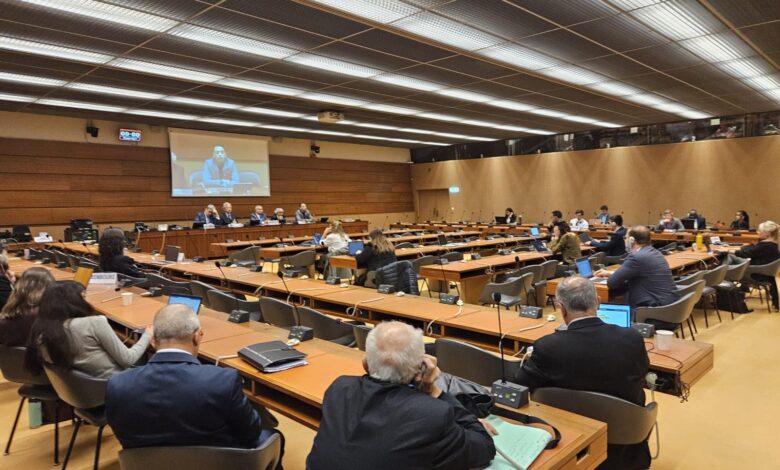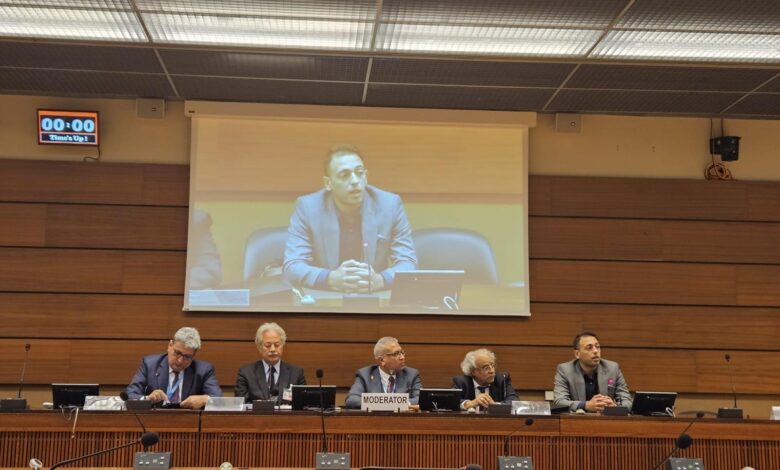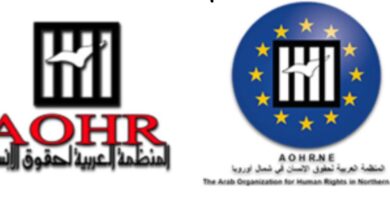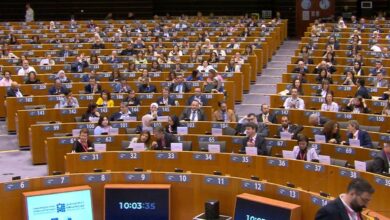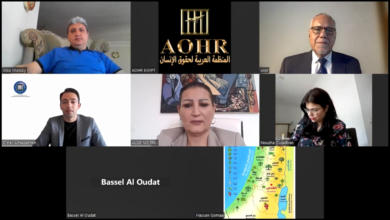International ActivitiesOur News
During the side event of “the Impact of Armed Conflicts on Human Rights” … it was affirmed that the international system is in need of structural reforms
The side event, organized by the Arab Organization for Human Rights (AOHR), took place at the Palace of Nations in Geneva on the sidelines of the 57th session of the United Nations Human Rights Council on October 1, 2024. It addressed the devastating impact of conflicts on the state of human rights in the Arab region.
The discussions were moderated by Mr. Mohamed Radi, the Executive Director of the Organization, and included speeches by Mr. Alaa Shalaby, President of the Organization; Mr. Diaa Al-Shammari, member of the Board of Trustees; Mr. Essam Shiha, member of the Board of Trustees; and Engineer Omar Al-Masalmeh, Secretary-General of the Organization’s branch in Northern Europe.
In his intervention, the President of the Organization highlighted the impending disaster expected in the region if the Israeli aggression against Palestine and Lebanon is not halted, which could undermine international peace and security, especially considering the multiple conflicts in the region, the ongoing war in Ukraine, and other global tensions.
Shalaby noted that four days prior, the Organization had submitted a comprehensive documentary file, which included testimonies of the wounded from the Israeli aggression who are receiving medical care in Egyptian hospitals. The file was prepared by a joint investigation mission between the Arab Organization for Human Rights and the Al-Mezan Center for Human Rights in occupied Palestine from February to June 2024. The mission is set to continue its work in the coming weeks.
While listing the concerns expressed by the Organization to officials of the International Criminal Court, Shalaby pointed to the widespread human rights outrage over some Western countries arguing before the ICC’s Pre-Trial Chamber against the Prosecutor’s requests to arrest suspects.
Shalaby also highlighted that the repeated use of the U.S. veto in the Security Council has undermined the Council’s role in maintaining international peace and security, particularly obstructing the Security Council from fulfilling its responsibilities in enforcing the International Court of Justice’s decisions on January 26, 2024. This is despite the obligation of all parties to the Genocide Convention to act collectively or individually to prevent the continued occurrence of potential genocide.
Shalaby added that the position of Western countries, which present themselves as models of freedom and human rights, regarding Israel’s occupation of Arab territories and its atrocities, has weakened faith in human rights worldwide. He noted that claiming Israel’s right to self-defense undermines international law, which mandates ending the occupation.
He concluded by emphasizing the need for structural reforms to address the imbalances in the international system, ensure compliance with international law standards, and enforce international decisions, particularly in protecting people’s rights and maintaining international peace.
In his intervention, Iraqi human rights expert Mr. Diaa Al-Shammari referred to the worsening human rights situation in Iraq following the U.S. occupation and its crimes in 2003, which ignited ethnic conflict in 2006 and gave rise to terrorism, as seen with the ISIS terrorist group. This led to the emergence of parallel state institutions and militias, culminating in the October 2019 revolution, which was violently suppressed by forces of political and economic corruption, leaving about 8,000 people awaiting final death penalty rulings.
Al-Shammari warned of the backsliding in the current reform process, stressing the need for radical reforms, including ending impunity, ensuring capable and willing judicial oversight over institutions, and upholding the rule of law.
In his intervention, Syrian human rights expert Engineer Omar Al-Masalmeh compared the catastrophic humanitarian situation in Syria to that in Palestine, Lebanon, and Iraq but highlighted the difference in its origin. Syria witnessed a peaceful popular revolution demanding freedom, social justice, and democracy, which was met with excessive violence by the ruling political regime, inviting allied foreign forces. This, coupled with the involvement of competing regional and international forces, led to the rise of a wide spectrum of armed groups with extremist, terrorist, or separatist ideologies, resulting in a proxy civil war. Consequences included the displacement of over 6 million refugees, internal displacement of over 7 million, approximately 550,000 deaths, and tens of thousands of people remaining in detention or forcibly disappeared, with nearly 15,000 citizens still missing. Additionally, the Syrian economy deteriorated into a war economy based on organized crime, such as human trafficking, organ trade, arms smuggling, and drugs. This has further destabilized the region and the world, especially with the continued absence of international and regional consensus on implementing Security Council Resolution 2254, which provides a roadmap for resolving the Syrian crisis in a safe and smooth manner, facilitating the safe and voluntary return of refugees, reconstruction, and achieving transitional justice — major future challenges facing the transitional governing body.
Al-Masalmeh stressed that the deterioration of human rights in the Arab region, including Syria, will inevitably lead to a decline in global human rights standards. He pointed to the successive waves of refugees that have fueled racist political and media discourse in Europe, the rise of far-right forces to power, and the resulting discriminatory measures against refugees and foreigners, as well as the systematic crackdown on the right to protest and peacefully assemble in support of Palestine, which can be seen as a significant step backward for human rights in Northern Europe.
In his intervention, Mr. Essam Shiha highlighted the impact of armed conflicts in a third of the region’s countries on those that remain stable. He emphasized how terrorist groups in conflict zones target the stability of peaceful countries, pushing stable governments to adopt more stringent measures that encroach on human rights guarantees in the context of counter-terrorism. Shiha also discussed the effects of terrorism on development rates, economic and social conditions, due to security concerns and increased public spending on armaments and security services, as well as how instability turns stable countries into destinations for refugees and transit countries for illegal migration.
Shiha gave the example of Egypt, which has suffered from terrorism for years and is currently experiencing a massive influx of refugees from neighboring Arab and African countries.
***

